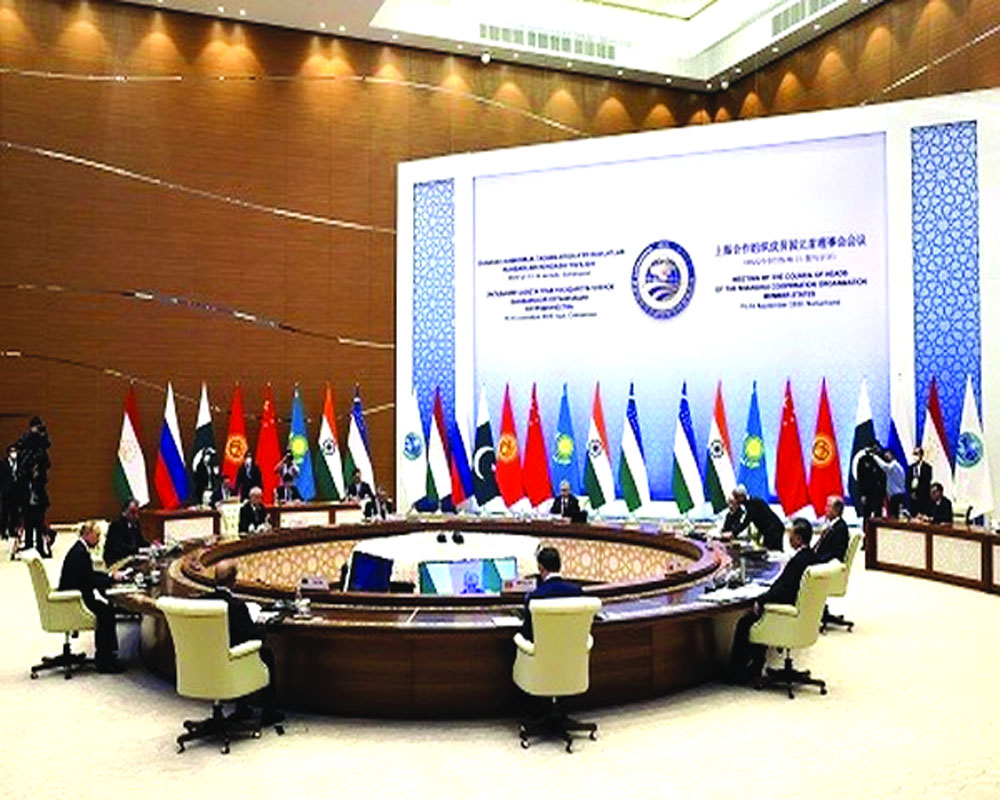Shanghai Cooperation Organisation is growing in stature and size
IIndia hosted the leaders from Shanghai Cooperation Organisation (SCO) in a virtual summit, this week, amidst rising mutual tensions in the group. This summit was to be held in person; however, geopolitical concerns forced India to host this virtually. India currently holds rotating SCO chairmanship, besides the prestigious G 20 presidency, which will see a high-octane grand finale, with the leaders’ summit being hosted in Delhi in September.
India wants to make full use of these leadership opportunities in multilateral and regional platforms to drive its newfound strategic agenda at a global scale while deepening bilateral ties with its key allies and partners.
All of this has been on full display in the past month or so with PM Modi’s first state visit to the US last month, topped with several key technology and defence-related announcements, all of which signal, what US President Biden has indicated, as the most significant partnership for the 21st century. India would like to showcase some of this leadership when leaders from all G20 countries, international organisations and special invitee countries descend in New Delhi for a two-day summit. However, the language on the war in Ukraine, which could be included in the leader's declaration statement, might not be agreeable to Russia and China, which could be a dampener.
This is where the SCO chairmanship for India comes into play as both Russia and China are also part of the SCO grouping. However, as the summit was held in a virtual format, it lost the opportunities available to leaders to step into bilateral conversations on contentious issues. It may be recalled that the Indian PM had a telephonic conversation with Putin last week, which according to a PMO press release reviewed “progress in bilateral cooperation and exchanged views on regional and global issues of mutual interest.” While discussing the situation in Ukraine, PM reiterated his call for dialogue.
Meanwhile, the Russian president showered India with praises a day earlier, when he called India to be a big friend. The India-Russia strategic partnership, going back decades hasn’t been hobbled, due to the newfound upgraded India, US strategic partnership.
It is against this background that the India-hosted SCO summit assumed importance. The Russia-India partnership, which is a careful dance by both partners to not trip close allies on either side is now seen as a sign of India’s mature diplomacy. Initially criticised by the US and the Western alliance, for not taking a hard stance on Russia, regarding the lengthy war in Ukraine, things started moving towards mature conversations during the latter part of last year. In September at the last SCO meeting in Samarkand, the Indian Prime minister told the Russian President “ this is not an era of war “, which later was adopted in the leader's joint declaration of the G20 Bali summit. This statement was an acceptable format in global diplomatic circles to agree on tossed current geopolitical positions. The current SCO summit happened in the backdrop of Russia being increasingly seen as weakened by the long-drawn war, not to mention the short-lived revolt by the Wagner private military group. It certainly places Putin in a weak position, especially vis a vis its friend without limits, China. India hasn’t been on one of its best relations with China since the first clashes in India’s northeast borders. Any bilateral conversation, at the leader’s level wasn’t expected at the SCO summit. However, to India’s credit by expanding the scope of SCO to include deradicalisation, millets, environment and digitisation besides having two work groups related to start-ups and traditional medicine, it did carve out a roadmap towards new regional cooperation.
(The writer is a policy analyst. The views expressed are personal)
























